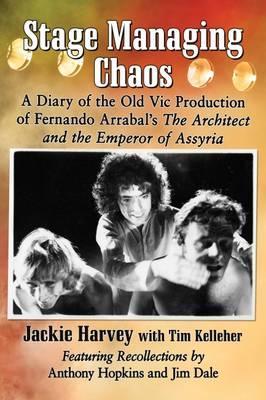 By JACKIE HARVEY, TIM KELLEHER (McFarland & Company; 2016)
By JACKIE HARVEY, TIM KELLEHER (McFarland & Company; 2016)
An irresistible read for theater buffs, Fernando Arrabal fans and just about everyone else. The subject of this book is the 1971 staging of Arrabal’s THE ARCHITECT AND THE EMPEROR OF ASSYRIA at the Old Vic theatre in London, as recounted through the highly witty and erudite diary entries of stage manager Jackie Harvey, along with recollections by several other principals, among them the lead actors Anthony Hopkins and Jim Dale. Harvey sums up the experience with an anecdote about how whenever she meets anyone who worked on the show “I only have to murmur the words “The Architect” and they shudder, eyes glazing over as they reminisce on the experience (usually in just one or two of their own carefully chosen and unprintable words).”
Arrabal’s play is an allegorical two character piece involving sadomasochism, nudity and cannibalism. Not exactly the sort of fare you’d expect to be approved by the Old Vic’s artistic director Laurence Olivier, although it does seem very much up the alley of the theater’s literary manager Kenneth Tynan (best known for co-scripting Roman Polanski’s MACBETH and devising the X-rated off-Broadway spectacle OH! CALCUTTA!), who persuaded Olivier to take the material on. It was also due to Tynan’s insistence that the avant-garde theater impresario Victor Garcia was signed on as director of the production, a choice that had rather profound consequences.
Jackie Harvey was chosen by Olivier himself to stage manage the production due to her vast experience and expertise. That, however, didn’t stop things from quickly descending into chaos. The show, we learn, was oft-kilter from the start, when Garcia asked the stage management team to research cannibalism, sex-change operations, torture and deformed births (a request that apparently “differs enormously from our normal duties at this stage”).
Garcia’s lunacy further manifested itself in his non-direction of the actors, who were left to navigate Arrabal’s bizarre text on their own (Garcia: “I have a very definite, clear, positive vision in my mind of (how to) achieve my objective. However, my intention is that neither of you will ever know what that objective is”). He also gave a missive to the lighting designer explaining “I want you to light this play without light,” told Harvey he’s Spanish even though he was actually French, and disappeared for long periods of time (because, unbeknownst to the Old Vic’s overseers, he was directing another production simultaneously).
Such methodology naturally caused a great deal of consternation among the actors. Hopkins is remembered as being “very concerned about powerful urges he feels during rehearsals to destroy the hall and everything in it, hopefully killing Victor in the process.” The problems didn’t abate as the production dragged on; just the opposite, in fact, with Harvey and her fellow stage technicians eventually forced to piece together the terminally disordered production on their own in the days leading up to the premiere, without their director’s input. Reviews of the show (excerpts from which are included here) were surprisingly positive, although the awful experience of putting it together impacted everyone involved.
That’s a fact made clear in Anthony Hopkins’ brief recollection, which sums up the production as an “unmitigated catastrophe” that soured him on the stage forevermore. Jim Dale’s recollection includes an anecdote about Olivier entering the rehearsal room, during which he “took one look, muttered “Oh fuck,” did an about-face and walked out again never to return.”
The rest of the recollections, by various others involved in the production, essentially repeat the same gripes. Furthermore, I’m not sure that the concluding mini-diary about Garcia’s Parisian production of Gene Genet’s THE MAIDS, put on at the same time as THE ARCHIECT AND THE EMPEROR OF ASSYRIA, is of much use, serving to confirm what was already made clear: that Garcia was a seriously weird, and possibly deranged, dude. This means that impatient readers can read Jackie Harvey’s recollections and skip the rest of the book without worrying about missing anything too important.
